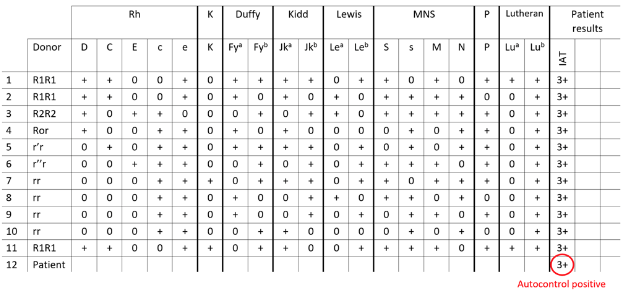Warm-Reactive Autoantibodies - Detection:
Warm autoantibodies are defined as those that optimally bind to RBCs at 37ºC. Because the antigens that bind antibodies preferentially at this temperature are often glycoproteins, and because glycoproteins tend to induce T-cell dependent immunoglobulin class-switching, most warm autoantibodies are of IgG class.
A warm-reactive autoantibody will therefore usually reveal itself during the indirect antiglobulin testing that accompanies the antibody screen, and will typically have the following attributes:
- All screening and panel cells will agglutinate with uniform reaction strengths when tested against patient plasma (Figure 1).
- The autocontrol will be positive with the same strength of reaction seen with the panel cells. See Module 4 for more information on the autocontrol.
- As most warm autoantibodies bind to universally-expressed antigens within the Rh complex, the strength of reaction against panel cells is enhanced with enzymatic treatment.
- All RBCs selected for transfusion will be incompatible by indirect antiglobulin test.
Figure 1. Example of a uniform pan-reactive panel with a positive autocontrol suggesting the presence of a warm autoantibody.

Next page: Confirmation
